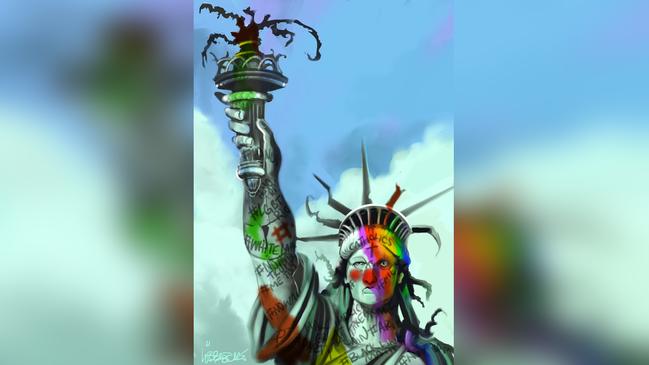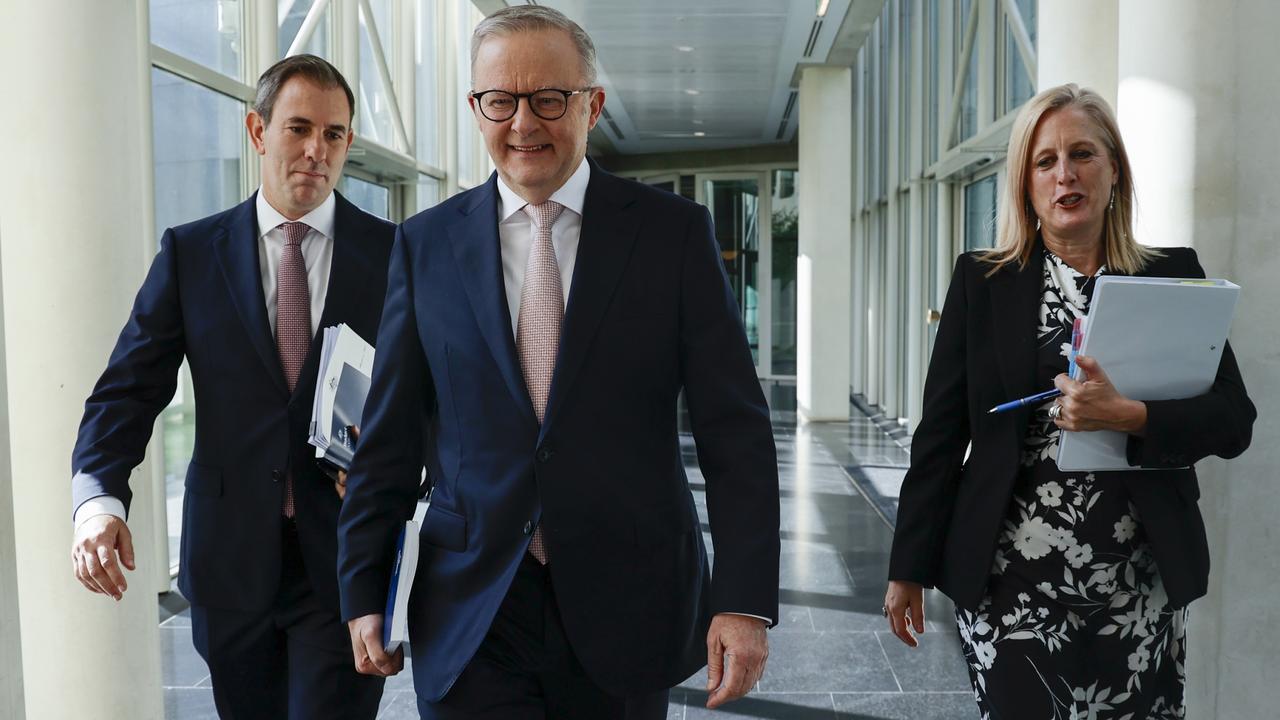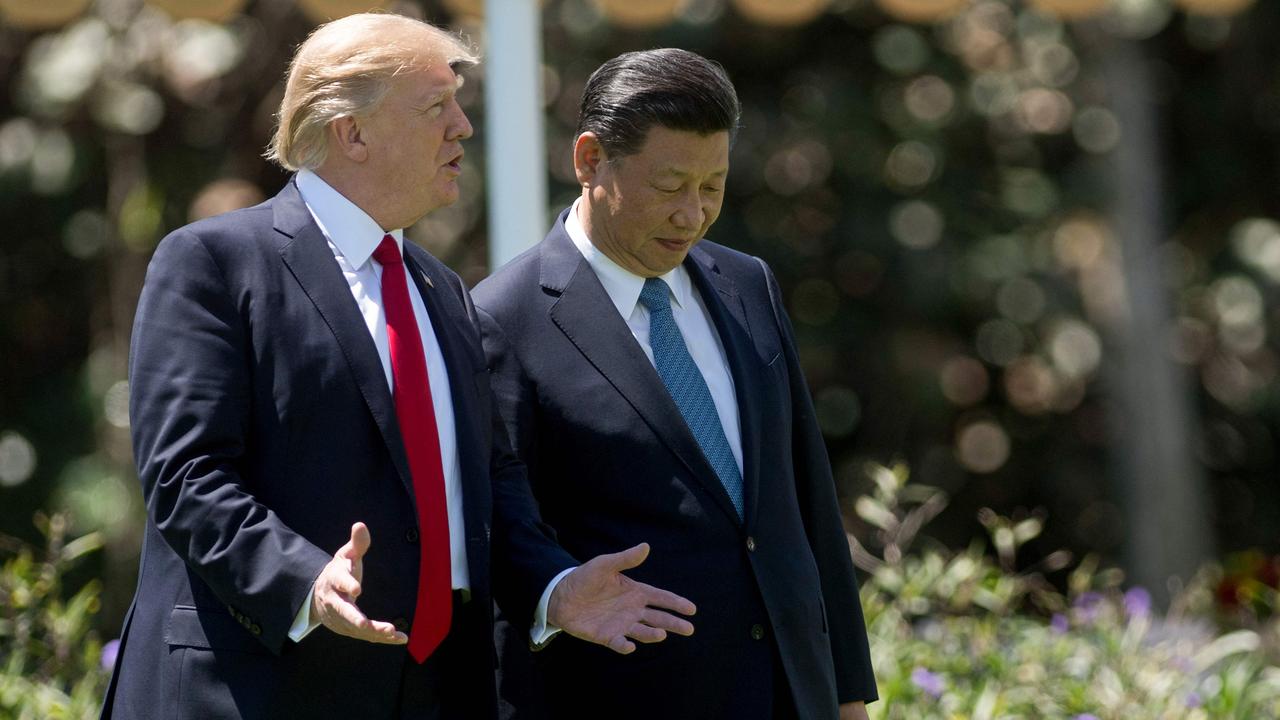
— Ross Douthat, The New York Times, Tuesday
Many Western democracies have succumbed to the malaise, the US most disastrously, with Australia still conspicuous as a holdout. The malaise is the erosion of the political centre — the once great middle-class suburban stability, anchor of family life, aspiration and widely shared cultural norms.
Beneath the hollowing-out of the political middle ground lies a deeper and destructive phenomenon: the crisis of Western liberalism, evident to a greater or lesser extent today in most democracies.
The story of the past century has been the titanic struggle between three ideologies — liberalism, communism and fascism. Since World War II the Western narrative has been dominated by the victory of liberalism and its legacy — steady economic prosperity, a negotiated distribution of benefits, functioning democratic systems and societies where incentives for harmony outweighed the quest for disintegration.
But the wheel of history has turned. At every point liberalism is under assault. The ethic of liberalism as an idea that both honoured individual liberty and provided principles by which human beings of all races and creeds could live, work, trade and conduct politics short of war and civil unrest is being discredited. The governing idea that made democracies successful is being pulled part, under attack from both right and left.
Much of this assault arises because of the failure of American liberalism. This failure is integral to the current upheavals — liberalism means equality before the law regardless of race, equal access to healthcare and education on the principle of universalism.
Yet the US today is engulfed in a series of social crises, with life expectancy for Americans falling for three successive years from 2015.
Liberalism has always been a broad creed, its basic tenets accepted by social democrats and conservatives as well as card-carrying liberals.
Its favoured prophets, Adam Smith and John Stuart Mill, will endure but they are far less invoked these days. The new age of rising anger and grievance is defined by excessive individualism and the relentless rise of subcultures, both trends advanced by technology. These are the killing agents stalking the liberal order.
Every political idea is subject to reinterpretation by succeeding generations. Liberalism is in trouble, betrayed by its friends as mirrored by ineffective government and under attack from a wide range of enemies.
From the right and left, ideologues, intellectuals, politicians on the make, champions of new causes and legions of the aggrieved are hacking away at liberal universalism, cursing its moral basis and consigning it to history’s dustbin. The conga line of such groups, extending as far as the eye can see, spans disillusioned Catholic conservatives, identity politics agitators, Trumpian populists and climate change radicals, a quartet that highlights the diversity of the political earthquake.
The shattering of centre-right liberalism in the US saw Donald Trump hijack the Republican Party and win the White House, the single most consequential event so far in the assault on liberalism. The next, with a different twist, was Brexit, where liberalism had been pushed too far in the embrace of open borders and was brought crashing back to earth.
Columnist Ross Douthat, in his 2020 book The Decadent Society, probes the cultural wasteland that Trump exploited: “He (Trump) is both an embodiment of our society’s distinctive vices and a would-be rebel against our torpor and disappointment; a figure who rose to power by attacking the system for its sclerosis while exploiting that same decadence to the very hilt. ‘Make America Great Again’ is a precisely calibrated statement of what you may call reactionary futurism, a howl against a present that wasn’t promised, the mixture of nostalgia and ambition that you would expect a decadent era to conjure up.”
Like most conservatives, Douthat believes politics follows culture. He sees Trump as a product of liberalism’s slide into cultural decadence. Trump exploits the decline of liberalism while being an agent of that decline. Douthat asks whether Trump’s meaning is that “our system could decay much more swiftly into authoritarianism or collapse into simple chaos — or whether Trump is instead fundamentally more farcical than threatening, too decadent himself to be a real threat to the system”. A clown at the bonfire.
Trump and Brexit have forged the stereotypical view about the assault on liberal values — that it comes from right-wing nationalistic and xenophobic populists. But this completely misunderstands the story.
The earlier assault on liberalism came from the centre-left in the form of a new elitism. It was the newly ascendant, highly educated, cosmopolitan, secularised, morally superior, opinion-making class that decided liberalism was hopelessly vapid and shifted to a more aggressive progressivism.
Its chief political casualty has been Hillary Clinton, whose presidential 2016 campaign based on a coalition of minority groups defined by race, gender, sexuality and generation led Clinton to mock Trump’s supporters as “deplorables”, a taunt she never lived down.
These forces possess their distinctive Australian parallels. At home, Scott Morrison seeks to hold the centre ground against pro-Trump conservative populists demanding he imitate their hero, while Anthony Albanese must calculate how many concessions he makes to the noisy progressive interest groups as the price for losing mainstream voters. With Labor’s vote at 33.3 per cent last election the nexus is set — the more progressive Labor gets, the more it loses middle-ground votes.
The progressive mantra is that Western liberalism is immoral with its tolerance of colonialism, invasion, racism, inequality, climate cowardice, sexism and patriarchy. While Australians are pragmatic and responsive to sensible changes in the liberal status quo, progressivism demands a new moral order that unnerves and divides the community. It is about power. It sees every issue in terms of a victim class and an oppressor class. It is more interested in power than solutions. It demands people change their values to fit its moral impositions and it is disgusted by how liberalism has tolerated so many reactionary views.
The betrayal of liberalism by progressive elites has been seductive, subtle and long in the making. As early as the 1990s this change in liberal culture was brilliantly captured by American writer Christopher Lasch, whose essays appeared in his 1995 book, The Revolt of the Elites.
Lasch wrote: “The new elites are in revolt against ‘Middle America’ as they imagine it: a nation technologically backward, politically reactionary, repressive in its sexual morality, middlebrow in its tastes, smug and complacent, dull and dowdy.
“Those who covet membership in the new aristocracy of brains tend to congregate on the coasts, turning their backs on the heartland and cultivating ties with the international market in fast-moving money, glamour, fashion and popular culture. Patriotism, certainty, does not rank very high in their hierarchy of virtues. ‘Multiculturalism’, on the other hand, suits them to perfection, conjuring up the agreeable image of a global bazaar … The new elites are at home only in transit, en route to a high-level conference, to the grand opening of a new franchise, to an international film festival or to an undiscovered resort.”
Lasch was describing what would become the central event on the left — the retreat from liberalism to progressivism. Elites decided that liberal universalism was boring, unexciting and out of step with the empowered individualism in which they exalted, finally freed from every cultural restraint.
American writer Yuval Levin argued in his 2016 book, The Fractured Republic, that culture was being re-engineered. It was now what the individual preferred it to be. Once your guiding star becomes your own self-expression then, as Levin says, we “recoil from any demands that we conform to the requirements of some external moral standard — a set of rules that keeps ‘me’ from being ‘the real me’, ‘true to myself’ ”.
Such rules were to be discarded. Indeed, they were to be mocked, with the Christian religion top of the list. Such individual empowerment leads to defiance of moral instructions handed down by church, state or nearly any authority. Those defying the authority are applauded because being “true to yourself” is seen as the ultimate morality.
Liberalism accepted the principle of non-discrimination. But this cannot satisfy progressives. They want minority-group distinctiveness to be validated. Rules and laws must change so any form of diversity and separateness is validated and celebrated. This is the super-highway to tribal culture and permanent political disruption.
In 1955 only 4.5 per cent of children in the US were born to unmarried mothers, while by 2015 it had risen to 41 per cent of births. If you believe the traditional family had a role in social and economic stability this transition is decisive. Data in the US shows deep tribulations in two groups — among African-Americans and the white working class. In their “depths of despair” analysis of American life, academics Anne Case and Angus Deaton find the most troubled category is people without a four-year college degree. Marriage rates at age 40 among that group declined by 50 per cent between 1980 and 2018, and this trend combines with falling wages and a dearth of good jobs.
The American demonstrations reveal a troubled but divided nation. In his New York Times column, Douthat said the riots were not just a testament to Trump’s “provocation and abdication” but exposed, in effect, the crisis on the left — what he called “the coalition of the liberal city” (think Democratic mayors and governors) — relying on an alliance of highly educated urbanites and an underclass “sharing a common political opponent but lacking a common way of life”.
Douthat nailed the malaise: “Above all, the liberal city lacks a middle — the ballast of a substantial middle class” and “the cement of shared religious and cultural institutions”. He said recent studies showed white liberals (think progressives) were “increasingly angrier about racism than the average black American”.
This links to my interview last year with American social psychologist Jonathan Haidt, professor at New York University’s Stern School of Business, whose 2012 book, The Righteous Mind, remains the masterclass in answering “why is it so hard for us to get along?”.
Identifying the real nature of the US domestic conflict, Haidt said: “The current political civil war is between two groups of educated white people with radically different views about what the country is, what morality is and what we need to do to move forward. The modern civil war is being fought by the extremes. Most Americans are non-political, but in a sense they don’t exist.”
The killing of George Floyd is an undisguised act of racial violence and abuse of police power. Blacks and whites have every justification to protest. But these demonstrations have become about something much bigger — about competing views of America. And the ideological battle between these views is spearheaded largely by rival white politicians, leaders and agitators.
Reflecting last year on the divisions in America, Haidt said: “We just don’t know what a democracy looks like when you drain all the trust out of the system. So I don’t know what the future will look like. It may just be a continued decline in trust and efficacy such that everything is contested, everything is fought.”
But Haidt, again, nailed the core problem, saying the battle between progressives and conservatives was akin to a struggle between “different cultures”.
He urged Australians to avoid following the US down this path. He warned that any nation seeking to save its liberal democracy must work “very hard to turn down tribal identities and inter-group conflicts”.
Haidt said liberal democracy was predicated on the ability of groups “to compete but also to co-operate”. He predicted violence in the US would increase because this was a contest between competing moral claims where more people believed “the ends justify the means”.
This is the consequence when the universal liberal culture — based around nation, family, community and shared benefits — is weakened from within and without. This is not just an American problem; it is rife in Australia.
The essence of liberalism has been treating people as people regardless of race, gender, sex, religion, age and ethnicity. This idea is now being dismantled in both the US and Australia under the flawed notion of progressive social justice. It attacks the universalism that has been the cement holding the social structure together.
While progressives are pulling apart the ideals of liberalism, the alienated ranks of Catholic intellectuals are in ferment, appalled by the damage being done to human life particularly among children, the decline of cultural tradition, the attrition of Christianity and the growing inroads of progressive morality. This Catholics movement has become one of the most powerful critics of liberalism, blaming its inherent weakness for the moral and social ills they see nearly everywhere.
The ultimate statement reflecting this rage is the 2018 book, Why Liberalism Failed, by Catholic academic Patrick J. Deneen, a social conservative, economic primitive and misguided political analyst. The thesis is that liberalism is to blame for the decline of religious faith and the destruction wrought by progressive morality. Deneen says 70 per cent of Americans believe their country is moving in the wrong direction and half the country thinks its best days are behind it. He said liberalism, with its ideals of limited but effective government, independent judiciary, responsive public officials and free and fair elections, has betrayed virtually every promise made in its name.
“Liberalism has failed — not because it fell short but because it was true to itself,” he said. “In practice (it) generates titanic inequality, enforces uniformity and homogeneity, fosters material and spiritual degradation and undermines freedom.” Deneen argues the tragedy is that liberalism — the first of the modern world’s competitor political ideologues after fascism and communism — is now exposed for its vices.
So alien is its view of human nature that America may be witnessing “the bankruptcy of its underlying political philosophy”. He wonders whether liberalism is approaching the “natural cycle” of decay that limits the lifespan of all human creations. Deneen says the contradiction of liberalism is that its triumph meant the undermining of “the classical and Christian understanding” of liberty, tradition and individual primacy.
Deneen’s mistake is his misallocation of blame. He blames liberalism for the failures of the conservative and religious movement when its failures are its own. It is true, however, that the growing alienation of religious people from what now constitutes liberalism is another burden it must carry. The bottom line is that regardless of whether liberalism’s critics come from the left or right, populists or priests, Trumpians or progressives, as Francis Fukuyama said in 1999: “Liberal democracy has always been dependent on certain shared cultural values to work properly.”
Twenty years later, it is obvious those shared values are gravely undermined and equally obvious that liberal democracy is no longer working properly. History, however, suggests liberalism has been in worse trouble at various times in the past. Its demise has been frequently predicted but such predictions always misjudged its immense recuperative ability.




The polarisation of American life, the withdrawal of liberal and conservative Americans from one another, has generated a poisonous distillation on both sides.